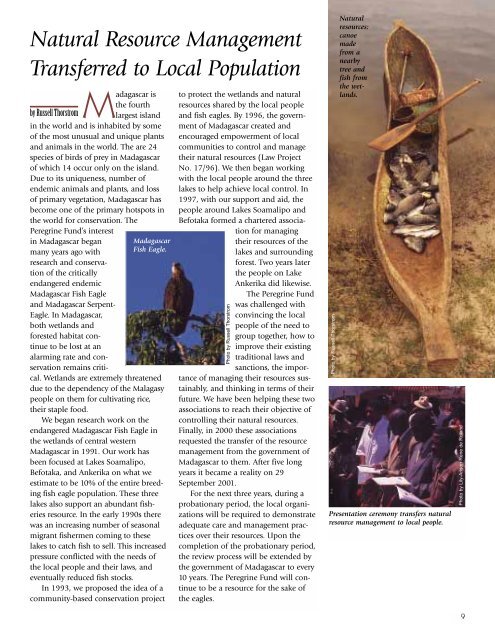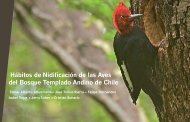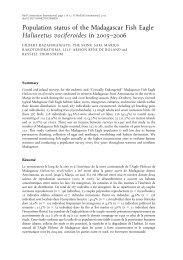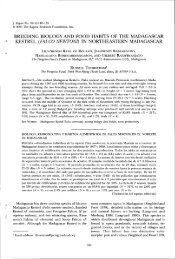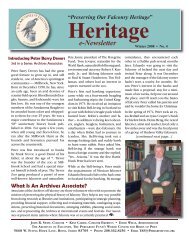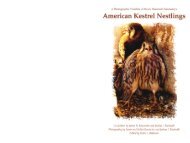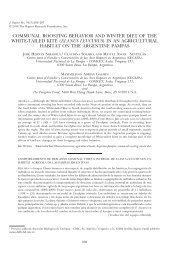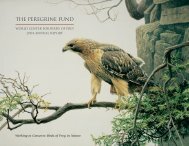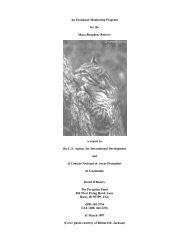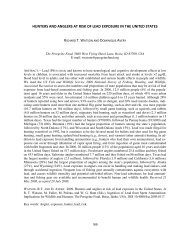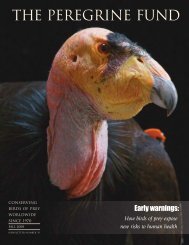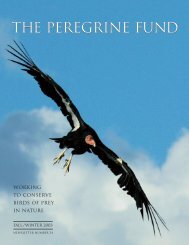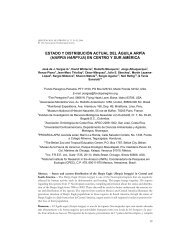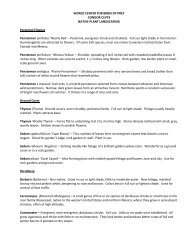2001 Newsletter - The Peregrine Fund
2001 Newsletter - The Peregrine Fund
2001 Newsletter - The Peregrine Fund
You also want an ePaper? Increase the reach of your titles
YUMPU automatically turns print PDFs into web optimized ePapers that Google loves.
Natural Resource Management<br />
Transferred to Local Population<br />
Madagascar is<br />
the fourth<br />
by Russell Thorstrom largest island<br />
in the world and is inhabited by some<br />
of the most unusual and unique plants<br />
and animals in the world. <strong>The</strong> are 24<br />
species of birds of prey in Madagascar<br />
of which 14 occur only on the island.<br />
Due to its uniqueness, number of<br />
endemic animals and plants, and loss<br />
of primary vegetation, Madagascar has<br />
become one of the primary hotspots in<br />
the world for conservation. <strong>The</strong><br />
<strong>Peregrine</strong> <strong>Fund</strong>’s interest<br />
in Madagascar began Madagascar<br />
many years ago with Fish Eagle.<br />
research and conservation<br />
of the critically<br />
endangered endemic<br />
Madagascar Fish Eagle<br />
and Madagascar Serpent-<br />
Eagle. In Madagascar,<br />
both wetlands and<br />
forested habitat continue<br />
to be lost at an<br />
alarming rate and conservation<br />
remains critical.<br />
Wetlands are extremely threatened<br />
due to the dependency of the Malagasy<br />
people on them for cultivating rice,<br />
their staple food.<br />
We began research work on the<br />
endangered Madagascar Fish Eagle in<br />
the wetlands of central western<br />
Madagascar in 1991. Our work has<br />
been focused at Lakes Soamalipo,<br />
Befotaka, and Ankerika on what we<br />
estimate to be 10% of the entire breeding<br />
fish eagle population. <strong>The</strong>se three<br />
lakes also support an abundant fisheries<br />
resource. In the early 1990s there<br />
was an increasing number of seasonal<br />
migrant fishermen coming to these<br />
lakes to catch fish to sell. This increased<br />
pressure conflicted with the needs of<br />
the local people and their laws, and<br />
eventually reduced fish stocks.<br />
In 1993, we proposed the idea of a<br />
community-based conservation project<br />
to protect the wetlands and natural<br />
resources shared by the local people<br />
and fish eagles. By 1996, the government<br />
of Madagascar created and<br />
encouraged empowerment of local<br />
communities to control and manage<br />
their natural resources (Law Project<br />
No. 17/96). We then began working<br />
with the local people around the three<br />
lakes to help achieve local control. In<br />
1997, with our support and aid, the<br />
people around Lakes Soamalipo and<br />
Befotaka formed a chartered association<br />
for managing<br />
their resources of the<br />
lakes and surrounding<br />
forest. Two years later<br />
the people on Lake<br />
Ankerika did likewise.<br />
<strong>The</strong> <strong>Peregrine</strong> <strong>Fund</strong><br />
was challenged with<br />
convincing the local<br />
people of the need to<br />
group together, how to<br />
improve their existing<br />
traditional laws and<br />
sanctions, the importance<br />
of managing their resources sustainably,<br />
and thinking in terms of their<br />
future. We have been helping these two<br />
associations to reach their objective of<br />
controlling their natural resources.<br />
Finally, in 2000 these associations<br />
requested the transfer of the resource<br />
management from the government of<br />
Madagascar to them. After five long<br />
years it became a reality on 29<br />
September <strong>2001</strong>.<br />
For the next three years, during a<br />
probationary period, the local organizations<br />
will be required to demonstrate<br />
adequate care and management practices<br />
over their resources. Upon the<br />
completion of the probationary period,<br />
the review process will be extended by<br />
the government of Madagascar to every<br />
10 years. <strong>The</strong> <strong>Peregrine</strong> <strong>Fund</strong> will continue<br />
to be a resource for the sake of<br />
the eagles.<br />
Photo by Russell Thorstrom<br />
Photo by Russell Thorstrom<br />
Natural<br />
resources:<br />
canoe<br />
made<br />
from a<br />
nearby<br />
tree and<br />
fish from<br />
the wetlands.<br />
Presentation ceremony transfers natural<br />
resource management to local people.<br />
Photo by Lily-Arison Rene de Roland<br />
9


